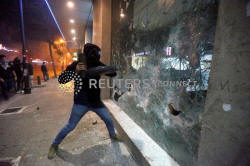U.N. official blames politicians for 'dangerous chaos'
in Lebanon
 Send a link to a friend
Send a link to a friend
 [January 15, 2020] By
Tom Perry [January 15, 2020] By
Tom Perry
BEIRUT (Reuters) - Lebanese politicians are
watching on as the economy collapses and protests turn angry, a senior
U.N. official said on Wednesday, rebuking a ruling elite that has failed
to agree a government or rescue plan for a country in deep crisis.
With banks tightly limiting access to cash, lenders were targeted in a
night of violent protests in Beirut's Hamra district. Bank facades and
ATMs were smashed and dozens of people wounded in confrontations with
police.
Heavily indebted Lebanon has struggled since the government was toppled
by the resignation of Prime Minister Saad al-Hariri in October as a
result of protests against corruption and bad governance that are root
causes of the economic problems.
Political rivalries have obstructed a deal on a new cabinet as the
crisis hits ordinary people: the Lebanese pound has lost around a half
of its value while anger at banking controls have led to rows and
violence in branches.

"Another day of confusion around the formation of a government, amidst
the increasingly angry protests and free-falling economy," Jan Kubis,
U.N. special coordinator for Lebanon, wrote on Twitter. "Politicians,
don't blame the people, blame yourselves for this dangerous chaos."
Kubis appeared to credit central bank governor Riad Salameh, saying he
had sought "extraordinary powers to at least somehow manage the economy
while those responsible watch it collapsing".
"Incredible," he wrote.
Salameh asked for extra powers last week, saying he wanted to
standardize the banking controls.
Looking to assure anxious depositors, parliament speaker Nabih Berri
said work was underway to safeguard people's money, especially small
depositors and those of expatriates, without specifying further.
"BEGGING" IN THE BANK
The long-brewing economic crisis snowballed last year as hard currency
inflows slowed down, leading to a shortage of dollars needed to finance
the state's deficit and import needs.
[to top of second column] |

Protesters smash the window of a bank as demonstrations against the
government continue in Beirut, Lebanon January 14, 2020.
REUTERS/Mohamed Azakir/File Photo

The violence in Beirut's Hamra area was some of the worst since anti-government
protests began in October. Security forces fired tear gas outside the central
bank to disperse protesters who pelted them with stones and fireworks.
One man hurled a car battery at the glass facade of a bank as another hit it
with a metal pole, Reuters TV footage showed. On Wednesday morning, glass was
being swept up at one vandalized bank as workers tried to fix a broken ATM at
another.
A woman on Hamra street who gave her name as Hind said she supported protests
against banks. "I have been coming here for the last three days and only could
take $300 ... we are begging, working 55 years to come and beg at the end," she
told Reuters.
"I was expecting what happened yesterday. Unfortunately the chaos is because of
the politicians," said Hamra shopkeeper Mohammad al-Rayyes.
The banking association condemned the attacks as the work of a "mercenary mob"
and not the "real revolutionaries of Lebanon" seeking reform. It condemned the
"severe and irresponsible tardiness in forming a new government", saying this
made it look like banks were responsible for deteriorating conditions.

The powerful Iranian-backed group Hezbollah and its political allies last month
nominated Hassan Diab, a little-known former minister, to form a new government
after the failure of efforts to forge a deal with Hariri, a traditional ally of
the West and Gulf Arab states.
(Additional reporting by Issam Abdallah, Ellen Francis; Writing by Tom Perry;
Editing by Giles Elgood, Mike Collett-White and Timothy Heritage)
[© 2020 Thomson Reuters. All rights
reserved.] Copyright 2020 Reuters. All rights reserved. This material may not be published,
broadcast, rewritten or redistributed.
Thompson Reuters is solely responsible for this content. |